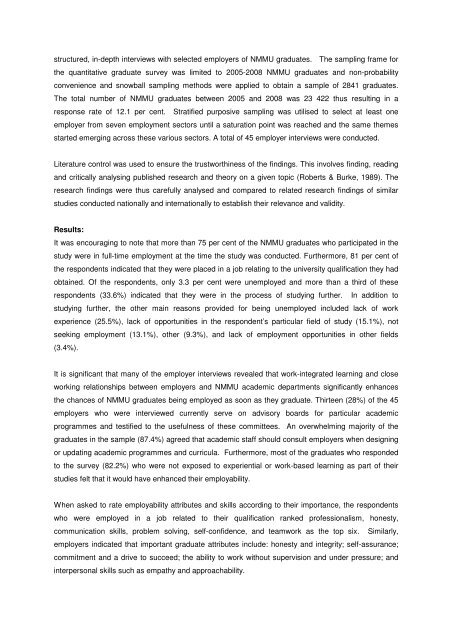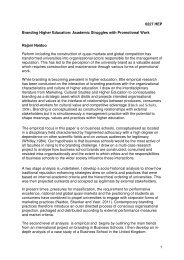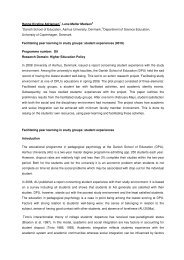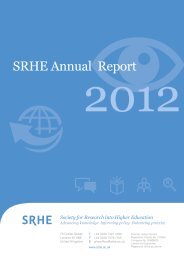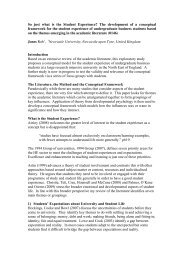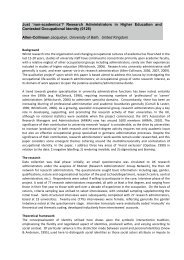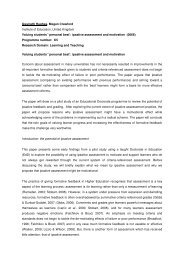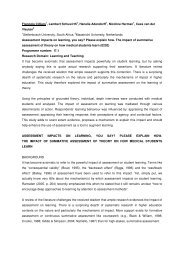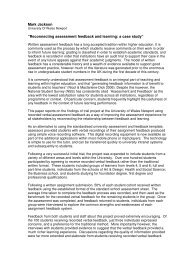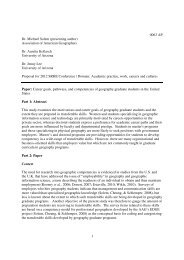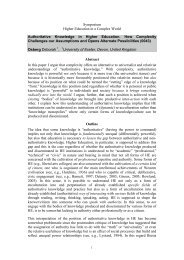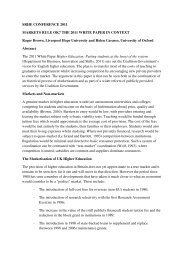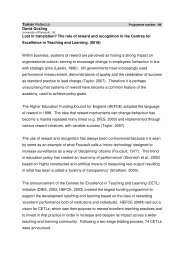A case study of the Nelson Mandela Metropolitan - Society for ...
A case study of the Nelson Mandela Metropolitan - Society for ...
A case study of the Nelson Mandela Metropolitan - Society for ...
Create successful ePaper yourself
Turn your PDF publications into a flip-book with our unique Google optimized e-Paper software.
structured, in-depth interviews with selected employers <strong>of</strong> NMMU graduates. The sampling frame <strong>for</strong><br />
<strong>the</strong> quantitative graduate survey was limited to 2005-2008 NMMU graduates and non-probability<br />
convenience and snowball sampling methods were applied to obtain a sample <strong>of</strong> 2841 graduates.<br />
The total number <strong>of</strong> NMMU graduates between 2005 and 2008 was 23 422 thus resulting in a<br />
response rate <strong>of</strong> 12.1 per cent. Stratified purposive sampling was utilised to select at least one<br />
employer from seven employment sectors until a saturation point was reached and <strong>the</strong> same <strong>the</strong>mes<br />
started emerging across <strong>the</strong>se various sectors. A total <strong>of</strong> 45 employer interviews were conducted.<br />
Literature control was used to ensure <strong>the</strong> trustworthiness <strong>of</strong> <strong>the</strong> findings. This involves finding, reading<br />
and critically analysing published research and <strong>the</strong>ory on a given topic (Roberts & Burke, 1989). The<br />
research findings were thus carefully analysed and compared to related research findings <strong>of</strong> similar<br />
studies conducted nationally and internationally to establish <strong>the</strong>ir relevance and validity.<br />
Results:<br />
It was encouraging to note that more than 75 per cent <strong>of</strong> <strong>the</strong> NMMU graduates who participated in <strong>the</strong><br />
<strong>study</strong> were in full-time employment at <strong>the</strong> time <strong>the</strong> <strong>study</strong> was conducted. Fur<strong>the</strong>rmore, 81 per cent <strong>of</strong><br />
<strong>the</strong> respondents indicated that <strong>the</strong>y were placed in a job relating to <strong>the</strong> university qualification <strong>the</strong>y had<br />
obtained. Of <strong>the</strong> respondents, only 3.3 per cent were unemployed and more than a third <strong>of</strong> <strong>the</strong>se<br />
respondents (33.6%) indicated that <strong>the</strong>y were in <strong>the</strong> process <strong>of</strong> <strong>study</strong>ing fur<strong>the</strong>r. In addition to<br />
<strong>study</strong>ing fur<strong>the</strong>r, <strong>the</strong> o<strong>the</strong>r main reasons provided <strong>for</strong> being unemployed included lack <strong>of</strong> work<br />
experience (25.5%), lack <strong>of</strong> opportunities in <strong>the</strong> respondent’s particular field <strong>of</strong> <strong>study</strong> (15.1%), not<br />
seeking employment (13.1%), o<strong>the</strong>r (9.3%), and lack <strong>of</strong> employment opportunities in o<strong>the</strong>r fields<br />
(3.4%).<br />
It is significant that many <strong>of</strong> <strong>the</strong> employer interviews revealed that work-integrated learning and close<br />
working relationships between employers and NMMU academic departments significantly enhances<br />
<strong>the</strong> chances <strong>of</strong> NMMU graduates being employed as soon as <strong>the</strong>y graduate. Thirteen (28%) <strong>of</strong> <strong>the</strong> 45<br />
employers who were interviewed currently serve on advisory boards <strong>for</strong> particular academic<br />
programmes and testified to <strong>the</strong> usefulness <strong>of</strong> <strong>the</strong>se committees. An overwhelming majority <strong>of</strong> <strong>the</strong><br />
graduates in <strong>the</strong> sample (87.4%) agreed that academic staff should consult employers when designing<br />
or updating academic programmes and curricula. Fur<strong>the</strong>rmore, most <strong>of</strong> <strong>the</strong> graduates who responded<br />
to <strong>the</strong> survey (82.2%) who were not exposed to experiential or work-based learning as part <strong>of</strong> <strong>the</strong>ir<br />
studies felt that it would have enhanced <strong>the</strong>ir employability.<br />
When asked to rate employability attributes and skills according to <strong>the</strong>ir importance, <strong>the</strong> respondents<br />
who were employed in a job related to <strong>the</strong>ir qualification ranked pr<strong>of</strong>essionalism, honesty,<br />
communication skills, problem solving, self-confidence, and teamwork as <strong>the</strong> top six. Similarly,<br />
employers indicated that important graduate attributes include: honesty and integrity; self-assurance;<br />
commitment and a drive to succeed; <strong>the</strong> ability to work without supervision and under pressure; and<br />
interpersonal skills such as empathy and approachability.


